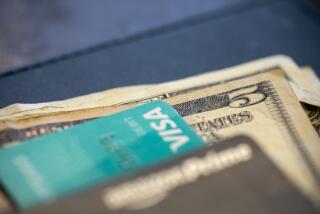Arrange car loan in advance to get a better interest rate
Dear Liz: I recently bought a new car, and the dealer, after running a credit check, told me my Experian score was 783. I have had only credit cards and no loans. This is my first auto loan. They gave me a 3.5% interest rate and I took it reluctantly. I do not like the rate and the need to pay huge interest over time, and am considering paying off the loan as soon as possible as there are no pre-payment penalties. If I am able to pay off my loan in a couple of months (instead of the original five-year loan term), will this improve or adversely affect my credit score? How will this look in the eyes of future lenders?
Answer: Paying off debt is a good thing, both for your credit scores and your wallet. The leading FICO credit scoring formula likes to see a big gap between your available credit and the amount you’re using. This is particularly true with revolving accounts, such as credit cards, but your scores also get a boost from paying down installment debt, such as auto loans and mortgages.
By the way, a 3.5% rate isn’t bad and wouldn’t cause you to pay “huge” interest. But you probably would have gotten a better rate had you arranged your financing in advance, say with a local credit union. If the dealership then offered you a better deal, you could cancel your application with the credit union. As it was, you left yourself at the mercy of the dealer — not a good idea.
Once you get this loan paid off, consider making the same-sized payments to a savings account so you can pay cash for your next car. If you do decide to finance again, try to keep your loan term to three or four years. That will help ensure you don’t buy more car than you can afford and could prevent you from being “upside down” (owing more than the car is worth) for much of the loan term, as is often the case with longer loans.
Don’t use 401(k) money to pay debt
Dear Liz: I will be 61 in December. I have $15,000 in credit card debt at 9.9% and $41,000 in a certificate of deposit earning 3% per year. I have $590,000 in my 401(k) account. I want to pay off the credit card balance to redirect my income to paying off my $26,000 mortgage by the end of 2013. Which near-term option for paying off the credit card is better: close the CD and buy a new, lower-paying CD with the balance after paying the card off, or take a 401(k) distribution, leaving the $41,000 emergency fund untouched?
Answer: Since you’re older than 591/2, you would not have to pay penalties on any withdrawal from your 401(k). But a withdrawal would still be a bad idea for a number of reasons.
The most obvious is that you would have to pay taxes on any amount you take out. Typically 20% is withheld from any distribution, but your bill could well be higher depending on your federal and state tax brackets. In the 25% federal and 8% state brackets, you’d owe $3,750 in federal and $1,200 in state taxes on a $15,000 withdrawal. So even without penalties, you’d lose one-third of a withdrawal to taxes.
The money you take out also wouldn’t be able to earn any future tax-deferred returns for you. At 60, you have a life expectancy of a couple more decades. The money you plan to withdraw potentially could grow to more than $70,000, assuming 8% average annual returns, if you leave it alone.
So using 401(k) money to pay debt is almost as dumb for you as it would be for a younger person who would pay penalties and incur an even bigger potential loss of future tax-deferred money.
Use the CD money instead, and change your spending habits so you don’t incur any future credit card debt.
Questions may be sent to 3940 Laurel Canyon, No. 238, Studio City, CA 91604 or by using the “Contact” form at asklizweston.com. Distributed by No More Red Inc.






